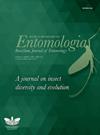昆士兰埃及伊蚊:巴西首次地理分布及其流行病学意义
IF 1.3
4区 农林科学
Q4 ENTOMOLOGY
引用次数: 1
摘要
埃及伊蚊是最成功地适应人类环境并将几种病毒传播给人类的蚊子。该物种有三个亚种,可以通过腹部鳞片颜色的变化来识别。每个亚种都有独特的鳞片颜色图案。本文描述Ae的第一寄存器。巴西本文章由计算机程序翻译,如有差异,请以英文原文为准。
Aedes aegypti queenslandensis: first geographic occurrence in Brazil and epidemiological implications
Aedes aegypti is the mosquito that has been most successful in adapting to the anthropic environment and transmitting several viruses to humans as well. The species has three subspecies that can identified by the variations in the color of the abdominal scales. Each subspecies possesses a distinct scale color pattern. Herein, it is described the first register of Ae. aegypti queenslandensis in São Paulo State, Brazil. Both the scale color pattern, and factor involved in the emergence of the local population are discussed, as well as possible epidemiological implications. A R T I C L E I N F O Article history: Received 12 November 2021 Accepted 05 March 2022 Available online 30 March 2022 Associate Editor: Leonardo Chaves
求助全文
通过发布文献求助,成功后即可免费获取论文全文。
去求助
来源期刊
CiteScore
1.50
自引率
12.50%
发文量
14
审稿时长
6-12 weeks
期刊介绍:
Information not localized

 求助内容:
求助内容: 应助结果提醒方式:
应助结果提醒方式:


